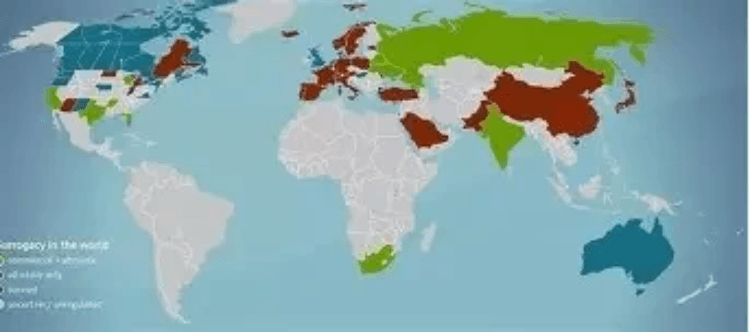Explore a comprehensive overview of surrogacy laws worldwide in 2025. Learn where surrogacy is legal, restricted, or banned to make informed decisions on your parenthood journey.
The journey to parenthood can take many forms, and for countless individuals and couples facing infertility, medical conditions, or other challenges, surrogacy offers a hopeful pathway. However, navigating the world of surrogacy is far from simple—especially when it crosses international borders. Laws governing surrogacy vary dramatically from country to country, with some nations embracing it under strict regulations, others imposing severe restrictions, and many outright banning it.
For intended parents considering surrogacy abroad, understanding the legal landscape is not just advisable—it’s essential. This guide provides a detailed, up-to-date overview of countries where surrogacy is legal or restricted, helping you make informed decisions while staying compliant with international laws and ethical standards.
What Is Surrogacy? A Brief Overview
Surrogacy is an arrangement in which a woman—known as the surrogate mother—carries and gives birth to a child for another individual or couple, known as the intended parents. There are two main types:
- Traditional Surrogacy: The surrogate is genetically related to the child, as her own egg is fertilized with sperm from the intended father or a donor.
- Gestational Surrogacy: The most common form today, where the embryo is created via IVF using eggs and sperm from the intended parents or donors. The surrogate has no genetic link to the baby.
Gestational surrogacy is generally preferred due to clearer legal parentage and reduced emotional complexity.
Why International Surrogacy?
Due to restrictive or unclear laws in their home countries, many intended parents look overseas for surrogacy options. Countries with well-established legal frameworks, advanced medical facilities, and lower costs become attractive destinations. However, this brings challenges related to citizenship, immigration, and legal recognition of parentage.
Countries Where Surrogacy is Legal (Altruistic or Commercial)
1. United States – The Gold Standard for Legal Clarity
The United States remains one of the most surrogacy-friendly countries, particularly for international intended parents. While surrogacy laws are determined at the state level, many states—including California, Nevada, and Illinois—have clear, surrogacy-positive legislation.
- Commercial surrogacy is legal in most states.
- Pre-birth parentage orders allow intended parents to be named on the birth certificate.
- Strong legal protections for all parties involved.
However, costs can be high (100,000–150,000), and visa processes for bringing the child home require careful planning.

2. Canada – Altruistic Surrogacy Only
Canada permits altruistic surrogacy, meaning surrogates cannot be paid beyond reimbursement for reasonable expenses (medical costs, maternity clothes, travel, etc.).
- Legal parentage can be established pre- or post-birth.
- The Assisted Human Reproduction Act (AHRA) ensures ethical standards.
- Popular among U.S. and international intended parents due to proximity and high medical standards.
Note: Advertising for surrogates or paying a surrogate beyond expenses is illegal and can result in criminal charges.
3. Greece – A Rising Star in Europe
Greece has emerged as a top destination for international intended parents, especially within the EU.
- Allows commercial surrogacy under strict regulation.
- Open to heterosexual couples, single women, and LGBTQ+ individuals (since 2021).
- Courts issue parentage orders before birth, ensuring legal recognition.
- Citizenship is granted at birth if at least one intended parent is Greek or EU citizen.
Its combination of legality, affordability, and European stability makes Greece a preferred choice.
4. Georgia (the country) – Clear Laws, But Limited Options
Georgia permits commercial surrogacy and allows both heterosexual and same-sex couples (including foreign nationals) to pursue it.
- Genetic link required: at least one intended parent must be genetically related to the child.
- Parental rights are granted immediately after birth.
- Low cost compared to Western countries.
However, recent scrutiny from European courts has raised concerns about the enforceability of surrogacy agreements in some EU countries, so intended parents must plan carefully for repatriation.
Countries with Restricted or Ambiguous Surrogacy Laws
1. United Kingdom – Altruistic Only, with Legal Hurdles
The UK allows altruistic surrogacy, but commercial arrangements are illegal.
- Surrogacy agreements are not legally enforceable.
- Intended parents must apply for a Parental Order after birth to gain legal custody.
- Must meet strict criteria: at least one parent must be genetically related, and they must be in a marital or civil partnership.
Despite restrictions, the UK’s strong healthcare system and legal framework make it a viable option for domestic intended parents.
2. Australia – State-by-State Regulation
Australia permits altruistic surrogacy, but rules vary by state.
- Commercial surrogacy is illegal nationwide.
- Interstate and international surrogacy are highly regulated.
- Intended parents often pursue surrogacy overseas (e.g., the U.S. or Canada), but face challenges in bringing the child home due to citizenship and legal recognition issues.
Ethical oversight is strong, but access remains limited.
3. Israel – Evolving Policies
Israel allows gestational surrogacy, but only for heterosexual couples who meet strict criteria (e.g., medical necessity, approval by a government committee).
- Recently expanded to include single women and lesbian couples.
- Commercial surrogacy is permitted under state supervision.
- High costs and bureaucratic delays are common.
While progressive in some ways, the process remains complex and not widely accessible.

Countries Where Surrogacy is Banned or Heavily Restricted
1. France – Total Ban
France maintains a strict prohibition on all forms of surrogacy.
- Surrogacy agreements are void and unenforceable.
- Children born via surrogacy abroad may face challenges in obtaining French citizenship or being registered with both parents.
- French courts have historically refused to recognize parentage established overseas.
Intended parents risk legal and emotional complications.
2. Germany – Illegal and Criminalized
Germany bans surrogacy entirely.
- Both commercial and altruistic surrogacy are illegal.
- Participating in or arranging surrogacy abroad can lead to criminal penalties.
- German citizens who pursue surrogacy overseas often face difficulties registering their child.
The legal stance is rooted in ethical concerns about commodification and maternal exploitation.
3. China – Absolute Prohibition
China outlawed surrogacy in 2001.
- No legal framework exists for surrogacy, domestic or international.
- Clinics offering surrogacy services operate underground and face severe penalties.
- Children born via surrogacy may not be recognized, and intended parents risk legal action.
Despite the ban, black-market surrogacy persists, posing serious risks.
4. Italy – From Ban to Limited Acceptance
Italy previously banned surrogacy, but a 2022 Constitutional Court ruling allowed the recognition of children born via surrogacy abroad under certain conditions.
- Domestic surrogacy remains illegal.
- Recognition depends on the child’s best interests and biological link.
- Process is case-by-case and not guaranteed.
This shift marks progress, but uncertainty remains.
Emerging Destinations and Legal Trends (2025)
As demand grows, new countries are re-evaluating their surrogacy laws.
1. Mexico – State-Level Differences
Mexico’s surrogacy landscape is complex:
- Tabasco and Sinaloa were once surrogacy hubs, but have tightened regulations.
- Jalisco now allows surrogacy for married couples with medical need.
- Legal parentage processes vary, and foreign intended parents face challenges.
Due to inconsistent enforcement, caution is advised.
2. Colombia – A Glimmer of Hope
Colombia does not have specific surrogacy laws, but courts have ruled in favor of intended parents in individual cases.
- No legal framework means high risk and unpredictability.
- Requires judicial approval for parentage.
- Not recommended for first-time or risk-averse intended parents.
3. South Africa – Legal in Theory, Limited in Practice
South Africa permits altruistic surrogacy under the Children’s Act.
- Strict requirements: intended parents must be residents, and a court must approve the agreement.
- Commercial surrogacy is illegal.
- Very few clinics offer services, limiting accessibility.
While legally possible, practical barriers remain high.

Ethical and Legal Considerations for International Surrogacy
Choosing a surrogacy destination involves more than cost and convenience. Key factors include:
- Legal Parentage: Can intended parents be recognized as legal parents from birth?
- Citizenship & Immigration: Will the child receive citizenship? What visa processes apply?
- Surrogate Rights: Are surrogates properly protected, informed, and compensated?
- Medical Standards: Are clinics accredited and regulated?
- Long-Term Implications: How will the child’s origin be documented and recognized?
Red Flags to Watch For:
- Lack of clear laws or court precedents
- No requirement for legal contracts
- Pressure to pay surrogates off-the-books
- Unregulated clinics with poor medical oversight
Case Study: Navigating Surrogacy in Ukraine (Pre-2022)
Ukraine was once a top destination for international surrogacy due to its clear laws allowing commercial surrogacy for heterosexual married couples.
- Genetic link required.
- Surrogates had no parental rights.
- Fast-track parentage recognition.
However, the ongoing conflict has suspended most programs. While the legal framework remains, safety and logistics are major concerns. This case underscores how geopolitical factors can instantly change the surrogacy landscape.
How to Choose the Right Country for You
Consider these steps:
- Consult Legal Experts: Work with international family law attorneys.
- Research Medical Facilities: Choose accredited clinics with proven success rates.
- Understand Costs: Include legal fees, medical expenses, surrogate compensation, and travel.
- Evaluate Risks: Assess political stability, language barriers, and repatriation processes.
- Prioritize Ethics: Ensure surrogates are fairly treated and fully informed.
No single country is ideal for everyone. Your choice should align with your personal, medical, and legal needs.

Conclusion: A Complex but Achievable Dream
Surrogacy offers life-changing opportunities for building families. While the global legal landscape is fragmented and constantly evolving, increasing awareness and advocacy are driving positive change.
Whether you’re considering surrogacy in the U.S., Canada, Greece, or exploring emerging options, knowledge is your greatest ally. By understanding where surrogacy is legal or restricted, you can navigate this journey with confidence, compassion, and clarity.
As of 2025, the trend is moving toward greater inclusivity and regulation. However, due diligence, professional guidance, and ethical considerations must remain at the forefront.
For intended parents, policymakers, and advocates alike, the goal remains the same: ensuring that surrogacy is safe, legal, and accessible—while protecting the rights and dignity of all involved.
